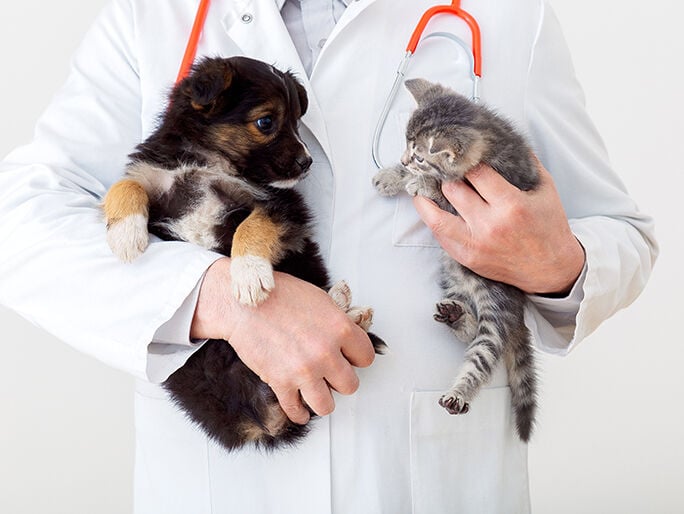roundworms and nematodes in pets
Roundworms are one of the most common intestinal parasites in dogs and cats. Here’s what to know and how to help reduce the risk for your pet.
Weight loss, stunted growth, or worms in your pet’s poop or vomit? Your pet needs safe and effective deworming to help rid their body of contagious parasites.

Roundworm symptoms in dogs and cats
- Diarrhea or vomiting
- Visible worms in feces or vomit
- Weight loss
- Dull, dry coat
- Rounded or swollen belly in an otherwise thin pet
- Coughing

Treating roundworm in dogs and cats
- Avoid home “remedies”
- Consult your veterinary team
- Administer vet-prescribed deworming medication

Help prevent roundworm
- Consult your veterinary team
- Routine deworming at the vet
- Parasite control that helps prevent roundworm
Roundworm is spread to both people and pets via contaminated soil.
Parks, playgrounds, play areas, and more can be contaminated with roundworm eggs. Different varieties can affect different species, including humans, so practice good hygiene and help your pet with good preventive care.

What to know about roundworms
The term “roundworm” refers to a few varieties of extremely common intestinal parasites in pets, including Toxoscara leonina, Toxocara cati, and Toxicara canis. Some of these varieties are found in dogs, while others affect cats, and even people.
Despite their name, adult roundworms aren’t round but long, tubular squiggles. Each worm can grow to be up to six inches long, which is why a big worm infestation can bloat your pet’s stomach even if they’re losing weight.
Roundworms have a complex life cycle. Once eggs are ingested by their new host, they hatch into larvae inside the intestinal tract. These larvae then migrate through different body tissues, including muscles, liver, and lungs and become dormant cysts.
Dormant roundworm cysts don’t activate all at once but can linger for months and even years. Once activated, the larvae return to the intestine to become full-grown parasites that drain nutrients and lay eggs into exiting stool.
Roundworms are especially dangerous to vulnerable puppies and kittens. An infestation can steal many important nutrients from young dogs and cats.
Do pets get roundworm from dog feces and dirty cat litter?
Roundworms are an extremely common parasite and can happen to even the most well-loved, best cared for pet. This parasite can spread in a few different ways.
Contaminated environments:
Pets of all ages can pick up roundworm eggs by sniffing, licking, or contacting infected feces, which can contaminate soil or sand and even plants with infectious roundworm eggs.
Eating roundworm eggs in wild animals:
Many small animals such as rats, earthworms, cockroaches, and birds don’t actually get roundworms, but act as carriers (paratenic hosts) for the parasite.
Prenatally or through mother’s milk:
Roundworm cysts can activate after estrus in unspayed female dogs, turning into larvae that cross the placental barrier to infect puppies in the womb. Larvae can also infest mammary glands and spread to puppies and kittens while nursing.
Dormant larvae:
Pets exposed to roundworms carry dormant cysts that resist deworming, which means that pets can develop new active infections months or even years after being treated for worms.
Signs of a roundworm infection in dogs and cats
Veterinarians typically diagnose roundworm by performing a fecal flotation test to find roundworm eggs in your pet’s poop. However, due to the roundworm life cycle, finding those eggs isn’t always easy.
If your pet is showing any combination of the symptoms below, it’s time for a vet visit — especially for vulnerable puppies and kittens, whose symptoms may be more pronounced.

Diarrhea and vomiting:

Worms in poop or vomit:
Unlike many other parasitic worms, roundworms don’t attach to the intestinal wall. Because they float freely inside the intestine, it’s not unusual for dead or live worms to pass out in pet waste.

Weight loss, run-down appearance, and round tummy:
Worms suck out nutrients your pet’s body needs, so your pet may start to look thin and run-down yet still have a rounded belly full of worms.

Coughing:
Roundworm larvae sometimes end up in the lungs, where they can cause coughing and respiratory disease.
How easy is it to get roundworm from a puppy or kitten?
Some kinds of roundworm are zoonotic, which means that they’re contagious to both pets and people. The most common is Toxocara canis, which affects both people and dogs.
In order for people to catch these kinds of worms, they have to actually ingest roundworm eggs, which are commonly found in playgrounds and parks and can survive there for many years. Small children who eat dirt or put their hands in their mouths are especially at risk.
You can help prevent the spread by making sure your pet is dewormed on a vet-recommended schedule. Plus, your veterinary team may be able to recommend certain kinds of parasite control that can help prevent worms.
If you suspect you or any member of your human family have roundworms, please see your human doctor.
Why it’s important to deworm your pet
Roundworms are extremely contagious. Pets can shed roundworm eggs in their poop without showing any visible symptoms. Plus, because infection can happen in the womb, infected puppies can pass contagious poop as early as 11 days after birth.
Not protecting or treating your pet can spread roundworms to pets and humans in your household, especially to small children. As for your pet, if left untreated they will continue to suffer an ongoing drain on their health — and unknowingly spread contagious eggs in their stool.
Tips on getting rid of worms in dogs and cats
Although home remedies like turmeric and coconut may be popular online, there’s no proof that they’re effective in preventing or treating roundworms. At best, these “cures” may not hurt your pet, but they’ll still have worms.
An active roundworm infestation is treated with safe and effective deworming medications provided by your veterinarian. Since not all larvae will be active at one time, your pet may need several rounds of medication to help fight the parasite.
How can I help prevent toxocariasis (roundworms) in my pet?
You can help your pet avoid roundworms by bringing them in for regular fecal exams and deworming and with regular parasite prevention.
Always complete all deworming medications as prescribed. Remember, even if your pet’s poop looks normal, they can still have worms!

Routine deworming for puppies and kittens:
Make sure puppies and kittens get preventive care to help protect them against getting (and spreading) intestinal parasites.

Regular deworming for dogs and cats:
Your veterinary team can provide an appropriate deworming schedule to help target new worm larvae as they activate in your pet.

Deworm pregnant or non-spayed female pets:
Talk to your veterinary team if you’re planning on breeding your female dog or cat. We may recommend deworming before or during pregnancy to help protect both mom and her litter.

Practice good hygiene with pets:
Pick up and bag pet poop promptly. Wash your hands thoroughly after touching your pet, their poop, or soil or plants in any area that animals may use as a restroom.

Parasite prevention:
Heartworm preventives can also help protect against roundworms. Ask your veterinary team what we recommend!
An Optimum Wellness Plan is a smart way to prevent pests
Our Optimum Wellness Plans® are affordable yearlong packages of essential preventive care. They're designed for different needs, ages, and lifestyles, and most include a yearly heartworm test that can also detect a number of tick-borne diseases.
It’s a simple way to tell if your pet has been exposed to any of these potentially dangerous diseases. Talk to your Banfield vet to find out what package is best for your pup or cat.

Need advice on flea control? Ping Pet Chat™!
Whether it's 3 a.m. or 3 p.m., connect with a real veterinary professional for immediate petcare advice. It's included in all Optimum Wellness Plans®!
Log in to start chatting
Save at the Banfield Shop
Our mission is to provide high-quality prescription meds for the pet you love. We believe in safe, effective petcare, so we thoroughly assess every item we carry. We offer discounts on eligible products with your pet’s Optimum Wellness Plan. And you can easily schedule deliveries with our super convenient AutoShip program.
Battle worms with Banfield

Heartworm, tapeworm, hookworm, whipworms, roundworm – these nasty little noodle-like parasites love hitching a ride inside your pet to steal the nutrients your BFF needs.
We’re here with love, health, effective deworming treatments, and worm prevention to help your pet’s guts and heart stay tenant-free.
If you suspect your dog or puppy, or cat or kitten has worms, seek help from your vet as soon as possible.
 Mites and mange
Mites and mange Podcast - Not Just Fluff
Podcast - Not Just Fluff



